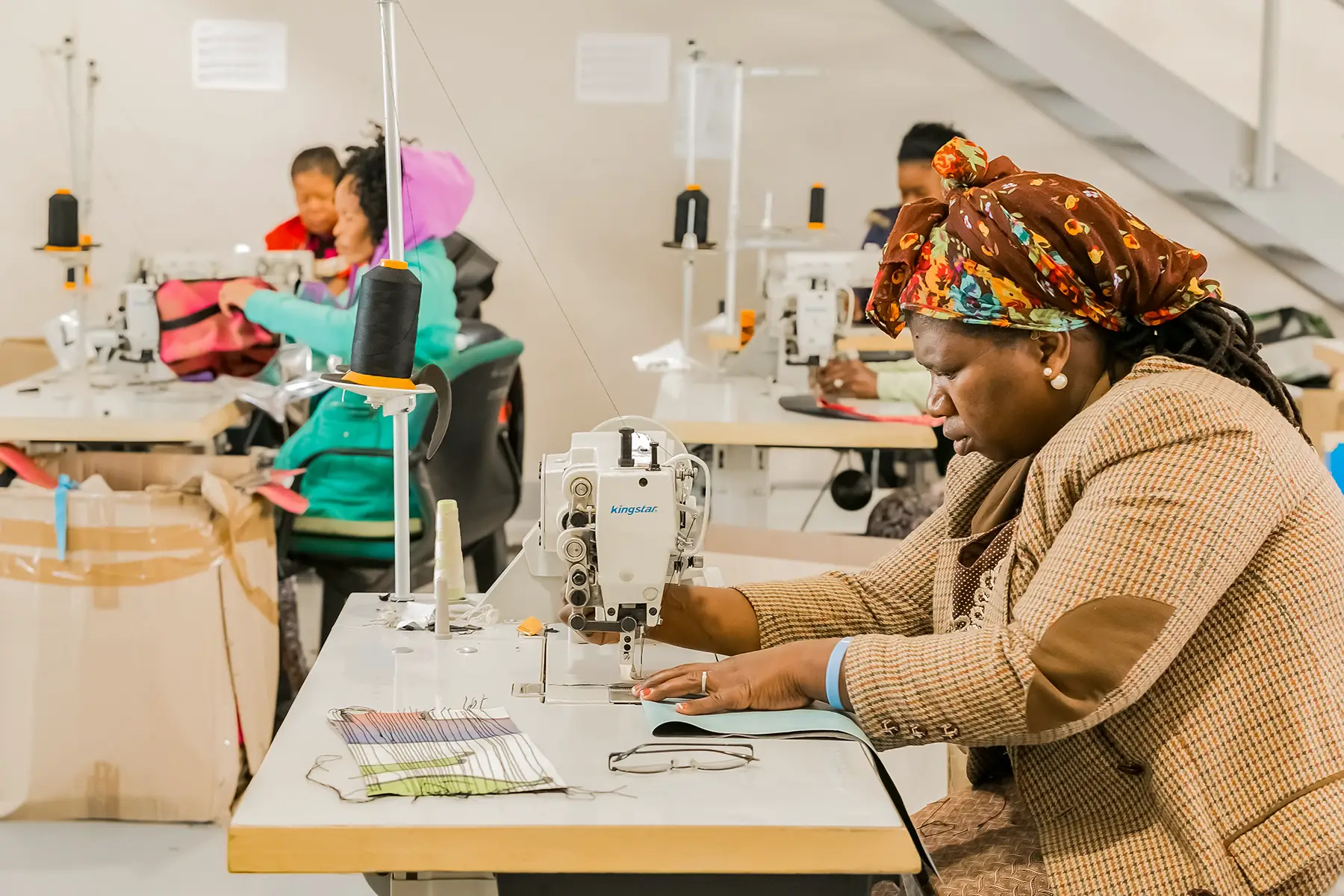Starting a career in South Africa as an expat offers unique opportunities in a vibrant and diverse job market. While the economy faces challenges, industries like education, tourism, and tech continue to grow. With thorough research and the right networks, your skills as a foreigner can become a valuable asset in this dynamic environment.
To find a job in South Africa, start with the following sections:
Coursera
Boost your career with Coursera. This online learning platform lets individuals and organizations learn new job-relevant skills. They partner with over 275 leading universities and companies to offer flexible, affordable courses. From hands-on projects to certificates and degree programs, start your learning journey today with Coursera.
The job market in South Africa
South Africa’s job market in 2025 presents a complex landscape. While certain sectors like technology and renewable energy are experiencing growth, the overall unemployment rate remains high, projected at approximately 32.7%.
Job seekers face fierce competition due to the large pool of unemployed individuals, especially among the country’s young people. In fact, youth unemployment in South Africa is particularly concerning, with rates around 45.5% in the third quarter of 2024.

However, opportunities exist in emerging industries for those with relevant skills and qualifications.
Challenges include economic instability and a mismatch between available jobs and workforce skills, while positives encompass sector-specific growth and potential policy reforms aimed at improving employment prospects.
Which career has the most job opportunities in South Africa?
South Africa’s main industries include:
- Mining and minerals
- Agriculture and agribusiness
- Financial services
- Manufacturing
- Telecommunications
- Energy and utilities
Skills shortages have been reported in a number of sectors, including:
- Engineering
- IT and technology
- Healthcare
- Education
- Construction and infrastructure
- Finance and accounting
- Legal and compliance
The biggest South African companies are:
- Sasol (Energy and Chemicals)
- Naspers (Media and Internet)
- Standard Bank Group (Banking)
- MTN Group (Telecommunications)
- Shoprite Holdings (Retail)
- Anglo American (Mining)
In addition to these, large multinational companies with a presence in South Africa include Unilever, Coca-Cola, Nestlé, and Volkswagen.
Jobs in South Africa for foreigners
South Africa presents a complex environment for expatriates seeking employment. It can be somewhat tough to get work as a migrant in South Africa unless you have specific skills and qualifications needed in the country. Most working-age expats moving to South Africa tend to have a job offer first before relocating.

While the overall unemployment rate is high, foreign-born workers actually have higher employment rates than their South African counterparts, though they may face tougher working conditions. This suggests that foreign workers may face less stable employment situations, though specific data on salary discrepancies between nationals and non-nationals is limited.
The country has introduced visa reforms to attract skilled foreign workers, including a new points-based system and a remote work visa that aims to boost economic growth. If you have a skill that is required by the South African economy, you can apply for a Critical Skills Visa. Details of requirements and how to apply are available on the South African Department of Home Affairs (DHA) website.
How to find jobs in South Africa
Expatica jobs in South Africa
On the Expatica job page, you can look for English as well as multilingual jobs in South Africa.
Public job sites
The Employment Services of South Africa (ESSA) contains information about employment and job vacancies on its website, however, you have to register first before accessing any of the website content.
Job websites in South Africa
There are also various general job websites, including the following:
If you work in a specialist field, check these websites for vacancies:
- Action Appointments – NGOs and development organizations
- CareerWeb – IT and technology
- eFinancialCareers – finance, banking, accounting, and insurance
- Michael Page – executive positions
Recruitment agencies
As a starting point, look in the Yellow Pages or Ananzi. You can also check out Expatica’s recruitment agency listings in our directory.
Foreign language teaching
To teach English in a school in South Africa, you’ll generally need to have a BA degree and a TEFL certification. Most teaching contracts begin in January and end in December. Some teachers also choose to teach at English language camps during school holidays or take on private lessons.

The main cities for teaching jobs are Cape Town, Johannesburg, Pretoria, and Durban. There are more than 300 English language schools across the country.
You can also look for jobs with the British Council and on TEFL-associated websites such as TEFL Academy, Teach Away, and i-To-i.
Embassies and foreign organizations
Look at the websites of embassies or consulates in South Africa to see what job opportunities are available – you don’t necessarily have to be a national of a particular embassy/consulate to work for one.
Depending on the diplomatic mission and the type of work, jobs can also be open to nationals, the spouses or partners of nationals, or to those of any nationality who have residency or the legal right to work in South Africa.
Newspapers
Check the classified ads in local and national South African newspapers, such as the Mail & Guardian and The Times South Africa.
Make the first move: speculative applications
It’s acceptable to make the first move and approach a company directly in South Africa. Look at company websites to find vacancies and to make speculative applications.
You can also find businesses via online business directories such as Ananzi, Brabys, and SAYellow.
Self-employment and freelancing in South Africa
You can start your own business or work as a self-employed person in South Africa, although you’ll need to apply for the relevant South African visa. Around 29% of all South African workers are registered as self-employed, which is much lower than the sub-Saharan African average (77%).
If you want to register your business as a limited company in South Africa, don’t forget that you will have extra paperwork and tax requirements.
Traineeships, internships, and volunteering in South Africa
You can find internships and summer placements with many NGOs or global companies via organizations such as AISEC or IAESTE. You can also search for internships worldwide at Globalplacement and GoAbroad.

Citizens from EU countries aged 17–30 can volunteer on aid projects in South Africa through the European Voluntary Service (EVS). You can also find volunteering opportunities in South Africa through GVI and WorkAway.
How do you apply for a job in South Africa?
When you first apply for a job in South Africa, send a brief profile only unless asked to do otherwise. This should be one side of A4 size containing personal details, education, and a list of previous jobs in chronological order, making clear which ones are the most relevant to the position for which you are applying.
Mention that a comprehensive CV is also available. Send a covering letter expanding on your suitability for the job if the application is speculative.
Interviews for South African jobs are broadly similar to in Europe or the US, although it will obviously depend on the type of job and company you are applying to. You should research the company in advance of the interview to prepare and come up with some good questions to ask. Be punctual and dress smartly, unless the interview invitation suggests dressing otherwise.
The interview will probably last between 30-60 minutes in most cases. If you are successful, you will be formally offered the job and the company will check your references. Typically, you will be asked to provide two to three referees who can attest to your skills, knowledge, and character.
See our guide to writing a CV and interview tips in South Africa for more detailed information. You could also try out an online resume builder such as Resume.io to make writing a CV even easier.
What are the requirements to find work in South Africa?
1. Do you need a South African work visa?
If you are planning to move to South Africa to work, you will need to apply for a work visa before you arrive. The visa acts as your temporary resident visa. You cannot come to South Africa on a tourist visa and then apply for a work visa.
You can apply for different types of South African work visas including a general work visa, critical skills visa, intra-company transfer visa, and a business visa (if you want to start your own business in South Africa).
2. What are the language requirements to work in South Africa?
While South Africa has 11 official languages, English is the language of business, politics, and the media. For most jobs, you need a good working knowledge of English. It is also desirable to have an understanding of Afrikaans in most workplaces.

If you want to improve your English or learn any of the local South African languages, read our guide to language courses in South Africa to find out what is available and where.
3. Can you transfer your qualifications to work in South Africa?
You will need to contact the South African Qualifications Authority (SAQA) to have your qualifications evaluated and to find out whether they are recognized in South Africa. It is possible to have your qualifications evaluated online. If the qualifications are not in English, they must be translated by a sworn translator.
You can find information on qualification recognition as well as a list of educational authorities in South Africa on the NARIC website.
If you’re working in certain sectors like medicine, architecture, or financial services, you may also need to register with the relevant South African professional or trade organization. Here is a list of some of the main professional associations:
- Chartered Institute of Management Accountants (SAICA)
- Dental Technology Association of South Africa (DENTASA)
- Engineering Council of South Africa (ECSA)
- Financial Sector Conduct Authority (FSCA)
- Health Professional Council of South Africa (HPCSA)
- Law Society of South Africa (LSSA)
- Independent Regulatory Board for Auditors (IRBA)
- South African Centre for Project Construction Managers & Plumbers (SACPCMP)
- South African Civil Aviation Authority (SACAA)
- South African Council for Natural Science Professions (SACNASP)
- South African Council for Social Service Professions (SACSSP)
- South African Council for the Architectural Profession (SACAP)
- South African Institution of Mechanical Engineering (SAIMECHE)
- South African Nursing Council (SANC)
- South African Pharmacy Council (SAPC)
- South African Veterinary Council (SAVC)
You can also pick up a new qualification to help improve your chances on the job market. For example, you might want to study in South Africa or obtain a job-related online degree, course, or certificate from a platform like Coursera.
4. You will need a tax and social security number
Once you start work in South Africa, you must register as a taxpayer with the South African Revenue Service (SARS) within 60 days of first receiving income. You will then receive a 10-digit unique tax reference number used in all your dealings with SARS and tax in South Africa.
You will also receive a social security card with its own unique social security number once you are enrolled for social security payments in South Africa.
Financial support while looking for a job in South Africa
Support is available to South African residents including foreigners who are looking for work. This is in the form of the Unemployment Insurance Fund (UIF) which is a benefit paid to job-seekers. However, it is contributions-based. This means you can only claim if you’ve been working at least 24 hours a week. The amount you get depends on how long you’ve worked for and how much you’ve paid in.
You can register for UIF online via the Department of Labor. This enables you to make contributory payments and apply for benefits.

If you want to improve your skills and knowledge while looking for work in South Africa, there are a number of employment training programs run by the government. The Department of Higher Education and Training has a list of programs available on its website.
See our guide to social security in South Africa for more information on benefits and support.
Starting your job in South Africa: important questions
In South Africa, employment contracts typically fall into three categories: permanent, fixed-term, and temporary.
- Permanent contracts offer long-term job security, with benefits like annual leave, sick leave, and retirement contributions.
- Fixed-term contracts are used for specific projects or time-bound roles, often lasting several months to a year, and may not include the same benefits as permanent positions.
- Temporary contracts are common in seasonal or short-term work and may lack job stability or benefits.
Probation periods are commonly included in employment contracts and typically range from 3–6 months, depending on the role and industry. During this time, either party can terminate the contract with shorter notice periods, as specified in the agreement.
Beyond making sure that you’re enrolled for social security in South Africa, which covers you for benefits, a South African pension, and public healthcare in South Africa, you might want to think about taking out private coverage for certain things once you land a job. This includes:
- Private health insurance in South Africa so that you can access the best healthcare available
- Unemployment insurance to top up the state-funded allowance which is quite low by European and American standards
- Supplementary pension to provide for your retirement in South Africa. Your employer may offer a good company pension, in addition to other non-cash benefits. If not, there are many private providers to choose from.
Useful resources
- Department for Employment and Labour – South African government department that oversees employment
- Employment Services of South Africa (ESSA) – government portal where you can access job information, look for vacancies and find employment training opportunities






